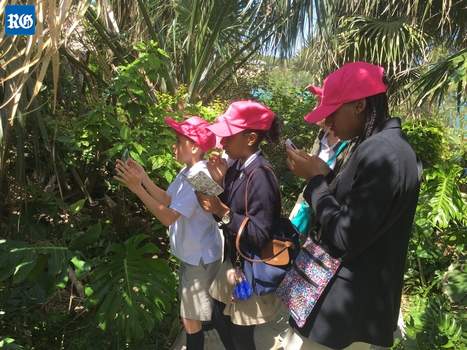Recent News
BIOS Scientist To Work With Ocean Tech ProjectFriday, August 05, 2016
A global marine research project designed to justify marine protected areas worldwide is set to launch in Bermuda next spring and will include the expertise of BIOS coral reef scientist Gretchen Goodbody-Gringley.
Daisy heads towards the Bahamas
Thursday, August 04, 2016
An endangered turtle rescued by fisherman off North Shore with a rusting hook caught in its trachea has left the island’s waters and is now swimming towards the Bahamas.
Subs exploring local waters
Sunday, July 31, 2016
Bermuda’s deep sea waters are being studied with submersibles by the international Nekton ocean exploration team, as part of Nekton’s XL Catlin Deep Ocean Survey.
Video: Nekton Mission’s First Submersible Dive
Tuesday, July 26, 2016
Nekton’s first deep ocean scientific research mission, which is sponsored by re/insurer XL Catlin and in partnership with the Bermuda Government’s Ministry of the Environment, launched off the coast of Bermuda this week, with the action caught on camera.
Ocean Scientific Research Mission To Launch
Tuesday, July 19, 2016
Nekton’s first deep ocean scientific research mission — sponsored by re/insurer XL Catlin and partnering with the Bermuda Government’s Ministry of the Environment — is preparing to launch off the coast of Bermuda this week.
About
GovernanceAbout Us
Newsletter
Latest News
Gift & Bookstore
Contact
General Inquiries
info@bzs.bm
Latest News
All the latest updates and news from the Bermuda Aquarium, Museum, and Zoo, one of Bermuda's leading visitor attractions!
Cindy Corday
Published May 25, 2017 at 8:00 am (Updated May 24, 2017 at 11:15 pm)

Springboard for learning: students explore the fascinating world of BAMZ
Bermuda Centre for Creative Learning teachers were recently contemplating how to inspire their students to create a non-fiction children’s information book.
Rather than take the traditional route: providing them with a list of subjects, or a supply of books to look through, they thought — why not use the Bermuda Aquarium Museum and Zoo, BAMZ, as a springboard for student learning, and let them lead the way? Students in this multi-age setting, began this non-fiction genre with a discussion about their prior experiences at BAMZ; the areas they recalled visiting and the animals and exhibits they enjoyed the most.
With BAMZ site maps, students were divided into small skill-set groups and created a plan of action for their upcoming trip to the site, based solely on their interests. A few days later, with digital devices in hand, they set off to BAMZ, super excited about their role as junior photographers.
Apart from a few guidelines from their teachers: take images of the animals and the signage at exhibits, stay with your group and be polite to others around you, the students cruised confidently throughout the site with great enthusiasm.
The interesting thing about this trip was that very little planning was involved — yet this experience took on a life of its own. Students worked really well with and helped each other. One commented, “Hey, here’s the Fossa, this is the animal I was telling you about! We’ve got to get a picture of him!” and another, “I was right, the flamingos get their colour from what they eat!” After the trip, and with parent help, students came back to school with the images they took loaded on to flash drives. The range of help from that point was differentiated: younger primary students had help printing their images and hand writing information, while older students set up PowerPoint pages, inserted the images and typed information about each animal in text boxes. Features of non-fiction text then became a meaningful process, because it was inspired by their work.
The end results proved that students who are involved in the process of their own learning, are far more engaged in the activity, retain information easily, than gathering information solely from a textbook or the internet. While helping to bind his book, one student noticed an error in the text and commented, “Wait, I see a problem on the page about the alligator. It says that most alligators eat about 50 meals a year, and the number of meals that humans eat isn’t there, it should say 1,000.” It was apparent that this student felt empowered about his project, clearly what teachers were hoping for.
Another aspect of learning at BCCL is to have empathy for others. Students wore pink baseball caps during the trip in honour of Mrs Kitty Ray, a friend who lives in Alexandria, Virginia and is courageously battling cancer. The Bermuda Centre for Creative Learning is a private school for students who have Dyslexia and other language-based learning differences beginning from age seven. BCCL is the first school of its kind on island, with the goal of changing the conversation about individuals who learn differently.
•Visit www.bermudacreativelearning.com for information


